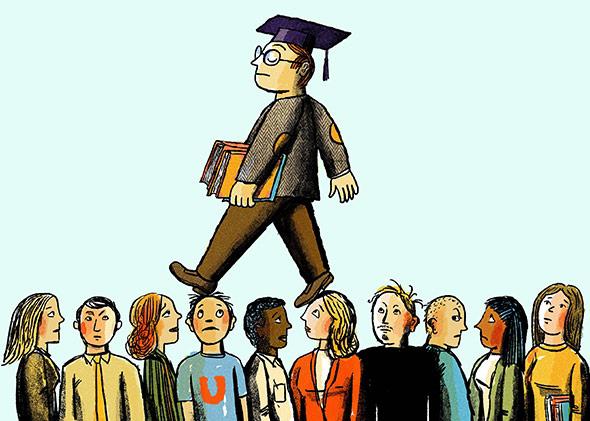When I recently called for the jettisoning of anonymous student evaluations of professors, several irate undergraduates responded with an excellent point: In some of their classes, they had little to no meaningful contact with their professors at all. Whether professors are hiding behind lecterns, never learning students’ names, avoiding eye contact, or making office hours unwelcome, many undergrads come away with the sincere belief that their professors either “hate” them, or don’t know them from Adam. So why not act out anonymously on evaluations?
And it’s true: Some (not all!) professors are a tad bit standoffish to students and peers. But this is mostly not on purpose! Academics, who lead depressingly solitary lives—they live largely in books and formulas nobody else understands; they have often never held jobs outside of a university setting—can be painfully shy and awkward. This can lead to unfortunate misunderstandings and poor evaluations, which can impact both job security and sense of worth, thus careening those poor suckers into a downward spiral of awkwardness.
What might surprise you, however, is that as it goes with fake doctors, so goes it with real ones: The medical profession has been dealing with the repercussions of “bad bedside manner” for years, and anyone who’s been to the hospital recently can tell you there has been a marked change in the way that medical staff interact with patients. For example, I recently suffered a miscarriage, and in the process I dealt with upwards of a dozen professionals at the large, hospital-affiliated practice where I get my care. From doctors to nurses to assistants, everybody who was tasked with giving me really bad news spared no unfortunate detail, but they did so with patience, empathy, eye contact, and warmth. I imagine they get four blighted ova a day in there, and yet they treated me like mine was the center of the world.
Indeed, in recent years, there has been a shift in the medical profession toward refining bedside manner. Part of this shift has come in the incorporation of empathy skills into medical school and residency. Misanthropic Dr. Houses of the world, you may soon fail the MCAT.
Back, then, to college. Though most doctoral candidates teach or will likely teach in the future, the Ph.D. does not include training in, or emphasis on, compassion and empathy—“deskside manner,” as it were. Should it? Some might argue a focus on empathy is just acquiescence to the customer-service mentality. After all, aren’t “patient satisfaction” surveys basically the student evaluations of the hospital? Just as students don’t often know what they need to learn, isn’t it true that patients often don’t know what they need to get better? What’s more important, you might ask, a nice doctor or a good one? A nice professor, or one who knows what she’s talking about?
Well of course the answer is, why can’t she be both? After all, the new emphasis on bedside manner in medical school is actually improving care, according to 13 recent clinical trials. Recent peer-reviewed studies, like this one published last month, attest it improves health outcomes.
And besides, I’d argue that there is a discernible difference between tough assignments (or a tough diagnosis) delivered with empathy and a personal touch, and assignments or treatment of any sort dispensed with a cold shoulder. We don’t have to conflate caring treatment with kowtowing to someone’s wants, and the best hospitals don’t. The best college professors don’t have to either—but there is no reason we shouldn’t incorporate basic deskside manner into our pedagogical training, because the medical-school model suggests that it can be taught. The old adage of “either you have ‘it’ or you don’t” is fallacious.
It’s not that I expect your John Nash–style eccentric physics prof to metamorphose into Mister Rogers (even though he already owns the cardigans), but if even the most awkward and curmudgeonly among us can be trained to crank out a 10-page conference paper on a three-hour plane ride, we can surely be trained to make eye contact with students, to mingle around the classroom or lecture hall, and to speak to students one on one—to say, “Oh, I remember finals from college; they were the worst!” while handing out study sheets. Academics can invent particle accelerators, and read Assyrian cuneiform; they can learn to say, “I realize this is a lot of work, but think about how accomplished you’ll feel when it’s done.”
Of course, the larger problem is that aside from specialized fields like composition or foreign languages, graduate students barely learn pedagogy at all. You read that right: Precious little, if any, academic “training” actually involves the craft of teaching undergraduates, even though that is allegedly the foremost purpose of a successful academic in all but the tiniest sliver of elite research universities.
But that does not have to be true. Yes, this will involve chucking yet another seminar in some senior prof’s pet subfield for a few credits in late-adolescent psychology and interpersonal communication, and that might be a fairly unwelcome development. But it’s all right if professors pitch a fit about this idea; I don’t take it personally. Because, see, any professor who acts like that probably just lacks the social skills to know any better. And luckily, that can be fixed.
